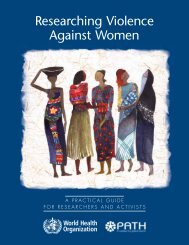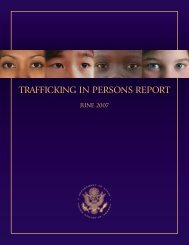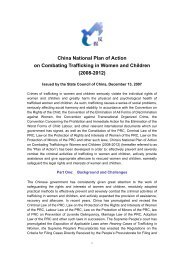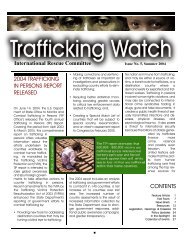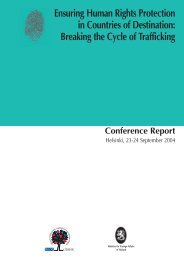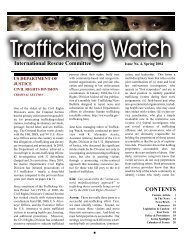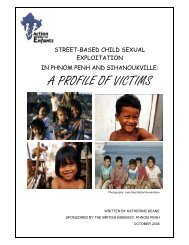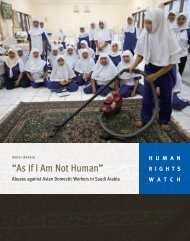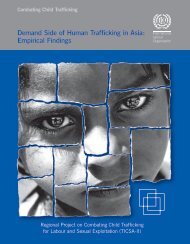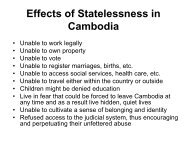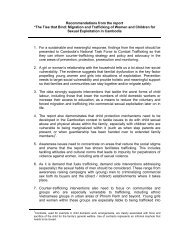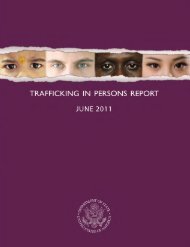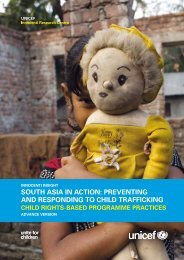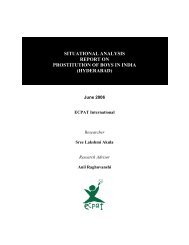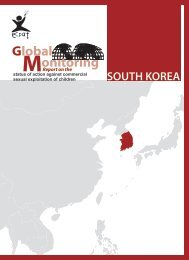Download PDF - Violence Against Children - East Asia and the ...
Download PDF - Violence Against Children - East Asia and the ...
Download PDF - Violence Against Children - East Asia and the ...
Create successful ePaper yourself
Turn your PDF publications into a flip-book with our unique Google optimized e-Paper software.
Cambodia<br />
The Mith Samlanh/Friends vocational<br />
traing program<br />
Mith Samlanh/Friends have worked with<br />
street children since 1994, <strong>and</strong> in addition to<br />
accommodation provision, government<br />
capacity building, advocacy <strong>and</strong> family<br />
reconciliation, have developed a respected<br />
training program. They have a number of<br />
partners, which have included World Vision,<br />
Save <strong>the</strong> <strong>Children</strong> Australia <strong>and</strong> UNICEF.<br />
Their good practice is contributing to a<br />
UNICEF initiative to address needs of street<br />
children in Laos.<br />
Mith Samlanh/Friends’ overall objective is,<br />
in accordance with <strong>the</strong> Convention on <strong>the</strong><br />
Rights of <strong>the</strong> Child (CRC), to support <strong>the</strong><br />
social reintegration of street children through<br />
reintegration into families, <strong>and</strong> reintegration<br />
into public school, employment, <strong>the</strong><br />
Cambodian culture <strong>and</strong> citizenship.<br />
Project objective<br />
The objective of <strong>the</strong> Mith Samlanh/Friends<br />
vocational training program is to provide<br />
training to youth (aged 15–25) in need,<br />
<strong>the</strong>reby improving <strong>the</strong>ir self-confidence <strong>and</strong><br />
access to income generating activities; this<br />
leading to gainful employment <strong>and</strong> social<br />
reintegration.<br />
The trainings respond to <strong>the</strong> needs of both<br />
<strong>the</strong> students <strong>and</strong> <strong>the</strong> market. Given that<br />
street youth usually have very low academic<br />
levels, <strong>the</strong> training is mostly practical. After<br />
training, students are ei<strong>the</strong>r oriented into<br />
fur<strong>the</strong>r training or supported to enter <strong>the</strong><br />
professional world (placement in companies<br />
or creation of private businesses).<br />
Outputs<br />
• 11 vocational skill-training workshops are<br />
offered to street children in mechanics,<br />
masonry, commerce, welding, electronics,<br />
electricity, farming, sewing, hairdressing<br />
for men <strong>and</strong> beauty for women, <strong>and</strong><br />
domestic service/cooking.<br />
• Over a one-year period, about 500<br />
children register in <strong>the</strong> Training Centre.<br />
Approach<br />
Training is divided into modules. This allows<br />
new students to start at any time of <strong>the</strong><br />
year. Each module corresponds to a level of<br />
training <strong>and</strong> to a placement opportunity, <strong>and</strong><br />
concludes with an examination. A diploma<br />
signed by <strong>the</strong> Ministry of Social Affairs,<br />
Labour <strong>and</strong> Vocational Training is given to<br />
students following <strong>the</strong> final examination.<br />
Students are encouraged to be responsible<br />
for <strong>the</strong>mselves <strong>and</strong> this is effectively<br />
implemented in <strong>the</strong> training. For example,<br />
students write requests for buying <strong>the</strong>ir<br />
training material, get <strong>the</strong> money from <strong>the</strong><br />
accountant, buy <strong>the</strong>ir material at <strong>the</strong> market<br />
<strong>and</strong> return <strong>the</strong> receipts <strong>and</strong> <strong>the</strong> change<br />
<strong>the</strong>mselves.<br />
The training produces goods <strong>and</strong> services<br />
that are sold through contracts, external<br />
orders, <strong>and</strong> businesses run by students. This<br />
training in a real professional environment<br />
provides revenue to <strong>the</strong> students, shows<br />
<strong>the</strong>m how to run a future business, <strong>and</strong> also<br />
aims at bringing <strong>the</strong> training program to a<br />
reasonable level of sustainability.<br />
All students benefit from literacy lessons,<br />
including: reading <strong>and</strong> writing, ma<strong>the</strong>matics<br />
(mostly accounting), history/geography, <strong>and</strong><br />
science (human body). Students who are<br />
interested can have English lessons when<br />
<strong>the</strong>y are literate in Khmer. Cooking <strong>and</strong><br />
commerce students all have English lessons<br />
because it is needed for <strong>the</strong>ir training.<br />
During <strong>the</strong>ir training time, children also have<br />
access to cultural activities (<strong>the</strong>atre, dance,<br />
30



